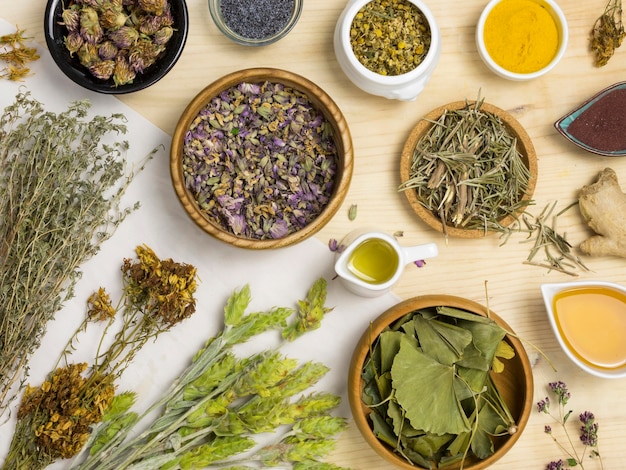Ask Ayurvedic doctor a question and get a consultation online on the problem of your concern in a free or paid mode. More than 2,000 experienced doctors work and wait for your questions on our site and help users to solve their health problems every day.
Understanding Anxiety through Ayurveda

Key Takeaways
- Ayurveda views anxiety as a disruption in mind-body balance, emphasizing the importance of understanding its root causes.
- Ancient Ayurvedic practices, such as meditation and yoga, are effective in promoting stress relief and inner harmony.
- Specific herbs like Ashwagandha and Brahmi are highlighted in Ayurveda for their anxiety-alleviating properties and can be easily integrated into daily routines.
- Lifestyle changes, including dietary adjustments and regular sleep patterns, are recommended in Ayurveda to enhance mental well-being and reduce anxiety symptoms.
- Embracing Ayurveda involves a holistic approach to managing anxiety, focusing on balance and mindfulness for long-term peace and wellness.
Anxiety can often feel like a storm inside your mind, leaving you restless and uneasy. But did you know that Ayurveda, an ancient healing system from India, offers unique insights into this modern concern? This article explores how Ayurveda views anxiety, offering a fresh perspective that blends age-old wisdom with today's challenges. We'll dive into the Ayurvedic understanding of anxiety, explore stress relief techniques, and introduce calming herbs that could bring peace to your daily grind. Whether you’re new to Ayurveda or a seasoned practitioner, there’s something here for everyone. So, let’s embark on this journey to understand anxiety through Ayurveda together.

Don't wait or self medicate. Start chat with Doctor NOW
Ayurvedic Techniques for Stress Relief
Ayurveda offers a wealth of techniques for stress relief that are both natural and effective. One popular method is meditation, which can reduce stress levels by up to 39%, according to a study by the American Psychological Association. This ancient practice helps calm the mind and improve focus. Another technique is pranayama, or controlled breathing, which balances the body's energies. Regular practice of pranayama can lower anxiety and promote relaxation.
Abhyanga, a type of self-massage using warm oils, is another Ayurvedic technique. It nourishes the skin and soothes the nervous system. Herbs such as Ashwagandha and Brahmi are also recommended in Ayurveda. These herbs are known for their calming effects and can be used in various forms, like teas or capsules. Together, these techniques form a holistic approach to managing stress naturally.

Exploring Anxiety Herbs in Ayurveda
In the world of Ayurveda, certain herbs are celebrated for their calming effects on the mind. These herbs have been used for centuries to help manage anxiety. One of the most renowned is Ashwagandha, often called the "Indian ginseng." It is known for its ability to reduce stress and promote a sense of well-being. People have used Ashwagandha to lower cortisol, the stress hormone, which can greatly aid in anxiety relief. A study published in the Journal of Clinical Psychiatry found that Ashwagandha can reduce anxiety levels significantly, making it a popular choice for those seeking natural relief.
Another powerful herb is Brahmi, which is believed to enhance mental clarity and calm the mind. It's often recommended for its adaptogenic properties, meaning it helps the body resist stress. Brahmi supports cognitive function and is also thought to improve memory, offering a holistic approach to mental health.
Tulsi, or holy basil, is another cornerstone in Ayurvedic medicine. Known as the "queen of herbs," Tulsi is praised for its ability to support stress relief. It can help balance the body's processes and has been shown to lower anxiety levels. A study in the Journal of Ayurveda and Integrative Medicine highlights Tulsi's potential in reducing stress and anxiety, noting its effectiveness in promoting emotional balance.
These herbs are often consumed in various forms, such as teas, capsules, or powders, making them accessible to many. By incorporating these Ayurvedic herbs, individuals may find a natural way to manage anxiety, complementing modern approaches. This integration of ancient wisdom with contemporary needs showcases the versatility of Ayurveda in addressing mental health challenges.
Lifestyle Changes for Reducing Anxiety
Adopting specific lifestyle changes can play a significant role in easing anxiety. Did you know that according to the Anxiety and Depression Association of America, regular exercise can reduce anxiety symptoms by up to 60%? This shows that even small changes can have a big impact on mental health.
Let's start with exercise. You don't need to run a marathon to feel better. Even a 30-minute walk can help calm your mind. Physical activity releases endorphins, which are natural mood lifters. Try to find an activity you enjoy, whether it's dancing, yoga, or cycling. Making it part of your routine can boost your overall well-being.
Next, consider your diet. What you eat affects how you feel. Incorporate foods rich in Omega-3 fatty acids like fish and flaxseeds. These can support brain health and reduce anxiety. Limiting caffeine and sugar intake is also beneficial since they can increase feelings of nervousness.
Sleep is another crucial factor. Lack of sleep can worsen anxiety. Aim for 7-9 hours of quality sleep each night. Create a relaxing bedtime routine. This might include reading a book or taking a warm bath. Making your bedroom a comfortable space can also promote better sleep.
Mindfulness and relaxation techniques are powerful tools too. Practices like meditation and deep breathing can help focus the mind and reduce stress. Even spending a few minutes a day can bring a sense of calm and balance.
Finally, don't underestimate the power of social connections. Spending time with friends or family can lift your spirits. Sharing your experiences with someone who understands can provide emotional support and reduce feelings of isolation.
The Road to Peace: Embracing Ayurveda
As we wrap up our exploration into how Ayurveda can help with anxiety, it's clear this ancient practice offers a path to both calm and clarity. By understanding the body's unique needs, Ayurveda provides personalized approaches to stress relief. Through diet, lifestyle changes, and anxiety herbs like Ashwagandha and Brahmi, Ayurveda works to balance the mind and body.
Ayurveda doesn't just treat symptoms. It digs deep, aiming to heal the root causes of anxiety. This holistic approach considers everything from daily routines to emotional wellness. By aligning with nature's rhythms, Ayurveda helps create a more balanced life. This balance can lead to reduced anxiety and improved overall well-being.
Have you tried incorporating any Ayurvedic practices into your life? Share your experiences and thoughts in the comments. Your insights could be helpful to others on a similar journey. If you're curious to learn more, explore related content and discover additional ways Ayurveda can transform your life.
Spread the word by sharing this article with friends or family who might benefit. The more we connect, the more we can support each other in finding peace and harmony through Ayurveda. Let’s continue this journey together, embracing the wisdom and serenity that Ayurveda brings.
FAQ For Anxiety
What is the Ayurvedic understanding of anxiety?
In Ayurveda, anxiety is viewed as an imbalance of the Vata dosha, which governs movement and communication in the body and mind. When Vata becomes excessive, it can lead to heightened nervousness and anxiety, disrupting the mind-body balance.
How can Ayurvedic techniques help with stress relief?
Ayurvedic techniques such as meditation, yoga, and Pranayama (breathing exercises) are designed to calm the mind and stabilize the nervous system. These practices help reduce stress by promoting relaxation and fostering a deep sense of tranquility.
Which Ayurvedic herbs are effective for alleviating anxiety?
Herbs like Ashwagandha, Brahmi, and Jatamansi are commonly used in Ayurveda to combat anxiety. These herbs have calming properties and can be incorporated into your daily routine as supplements or teas to support mental well-being.
What lifestyle changes does Ayurveda recommend for reducing anxiety?
Ayurveda suggests maintaining a regular daily routine, eating a balanced diet tailored to your dosha, getting adequate sleep, and practicing mindful activities. These lifestyle changes help stabilize Vata and reduce anxiety symptoms by promoting harmony in your life.
How can diet influence anxiety according to Ayurveda?
In Ayurveda, a diet that pacifies Vata is recommended for anxiety management. This includes warm, nourishing foods like soups, stews, and cooked grains. Avoiding stimulants and cold, raw foods can also help maintain a balanced mental state.
Can Ayurveda be integrated with conventional anxiety treatments?
Yes, Ayurveda can complement conventional treatments for anxiety. It's advisable to consult with healthcare professionals to create a cohesive plan that integrates Ayurvedic practices with any prescribed medications or therapies for a holistic approach.
What is the first step towards embracing Ayurveda for anxiety management?
The first step is understanding your dosha and identifying any imbalances. Consulting with an Ayurvedic practitioner can provide personalized guidance on incorporating Ayurvedic principles into your lifestyle to manage anxiety effectively.

